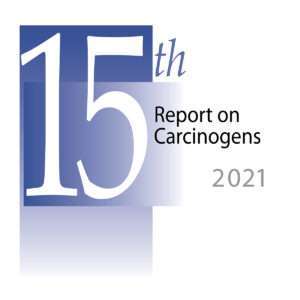
El pasado 21 de diciembre de 2021, el Departamento de Salud y Servicios Humanos de EE. UU. (HHS) publicó el 15º Informe sobre Carcinógenos. Se trata de un documento de salud pública con base científica y ordenado por el Congreso que el Programa Nacional de Toxicología (NTP) prepara para el HHS. Este informe acumulativo ahora incluye 256 listados de sustancias de todo tipo, como agentes químicos, físicos y biológicos, mezclas, y circunstancias de exposición, que se sabe o se prevé razonablemente que causan cáncer en humanos. El informe no incluye estimaciones del riesgo de cáncer porque los factores que influyen en si una persona desarrollará o no cáncer son múltiples y se combinan a lo largo de la vida del individuo. Entre ellos se incluyen la potencia cancerígena de las sustancias a las que se expone el individuo, el nivel de carcinogenicidad de éstas, la duración de la exposición, y la susceptibilidad del individuo a la acción cancerígena de las diversas sustancias.
En este 15º Informe, el HHS ha incluido la infección crónica por la bacteria Helicobacter pylori como carcinógeno humano. «El cáncer afecta la vida de casi todos, ya sea directa o indirectamente», dijo Rick Woychik, Ph.D., director del Instituto Nacional de Ciencias de la Salud Ambiental y el NTP. «Dado que la identificación de carcinógenos es un paso clave en la prevención del cáncer, la publicación del informe representa una importante actividad gubernamental para mejorar la salud pública».
H. pylori es una bacteria que coloniza el estómago y puede provocar gastritis y úlceras pépticas. La mayoría de las personas no presentan síntomas. La infección crónica puede provocar cáncer de estómago y un tipo poco común de linfoma de estómago, el linfoma MALT gástrico. La infección ocurre principalmente por contacto entre personas, especialmente en condiciones de viviendas con baja higiene, o al manipular tierras regadas con aguas fecales o beber aguas contaminadas. Ciertos grupos raciales y étnicos se ven afectados de manera desproporcionada por la infección por H. pylori, aunque se desconoce si existe una mayor predisposición a infectarse o es una cuestión exclusivamente de higiene. El tratamiento de las personas infectadas que tienen úlceras de estómago o signos de infección de estómago puede reducir el riesgo de cáncer.
En todo el mundo, la infección por H. pylori contribuye a 780.000 nuevos casos de cáncer cada año, aproximadamente el 6,2% de todos los casos de cáncer. Tanto el cáncer de estómago como la infección por H. pylori afectan de manera desproporcionada a las personas que viven en la pobreza y a ciertos grupos raciales, étnicos e inmigrantes. Para abordar este problema de salud pública, el Informe sobre Carcinógenos detalla las actividades para prevenir el cáncer de estómago inducido por H. pylori y las recomendaciones de los grupos de trabajo nacionales e internacionales. Muchos grupos de expertos recomiendan programas de prevención y seguimiento de personas o poblaciones con alto riesgo de cáncer de estómago.
Fuente: National Toxicology Program; https://ntp.niehs.nih.gov/whatwestudy/assessments/cancer/roc/index.html